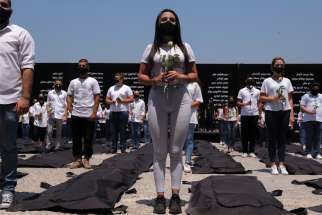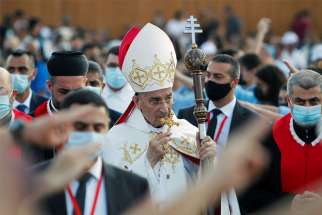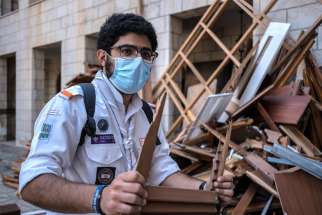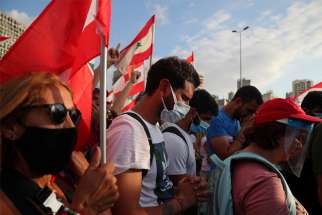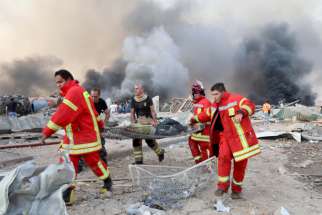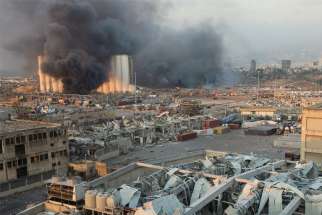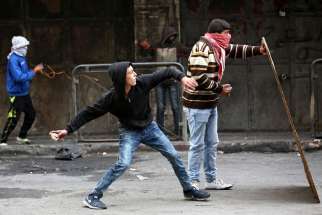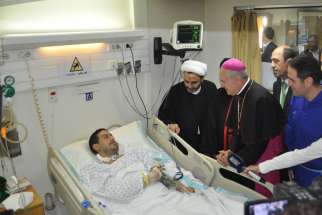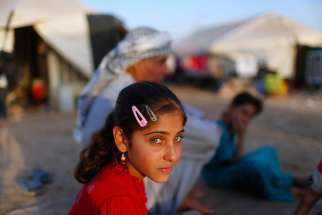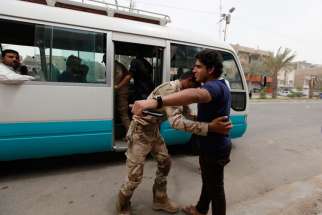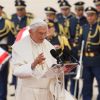Pope Francis marks anniversary with appeal for aid
VATICAN CITY -- Marking the one-year anniversary of a deadly explosion in Beirut, Pope Francis said Lebanon needs concrete help — not just words — from the international community so it can emerge once again as a symbol of fraternity and peace for the Middle East.
BEIRUT -- A year after the catastrophic Beirut port blast, the wounds of the people in Lebanon are scarred by the memory of the tragedy, and cries for justice escalate. This year, Aug. 4 was declared a national day of mourning in Lebanon.
BEIRUT -- In a flash, people's lives were forever changed shortly after 6 p.m. Aug. 4. And from the moment after the blast, the driving concern for Maronite Catholic Archbishop Paul Abdel Sater was to be beside the people of his archdiocese in their suffering and to keep them in their homes.
Canadian bishops offer prayers and support for Lebanon
OTTAWA -- Canadians and the Catholic Church in Canada have always been there for the people of Lebanon in times of need, says the Montreal-based Maronite Catholic Bishop Paul-Marwan Tabet.
VATICAN CITY -- After a massive fire triggered a deadly explosion in Beirut, Pope Francis called for prayers and a united effort to help Lebanon overcome "this serious crisis."
AMMAN, Jordan -- Hospitals in the Lebanese capital are overwhelmed with those suffering injuries from a massive explosion in Beirut's port, causing widespread damage the city and rocking the tiny Mediterranean nation already devastated by the coronavirus and its worst financial crisis since the 1975-1990 civil war.
Peace is the only solution
During recent travels in Beirut I met Kamal and his family, Syrian-Armenian Christian refugees. They told a harrowing tale.
Lebanon's nuncio visits Muslim bomb victims, stresses nation's diversity
BEIRUT - Archbishop Gabriele Caccia, the Vatican nuncio to Lebanon, visited hospitalized victims of twin suicide bombings in Beirut and said Lebanon's "message of co-existence" needs to be preserved, despite the crises the country is enduring.
BEIRUT, Lebanon - A Vatican official who just returned from a visit to Syria said "the humanitarian situation is worse than I thought."
BEIRUT - Church leaders in northern Iraq struggled to find shelter for Christians who were among hundreds of thousands who fled Mosul, the country's second-largest city, after Islamist forces took over much of the town, a Chaldean Catholic archbishop said.
Aid groups gather in Beirut to discuss Syrian refugee crisis
BEIRUT - Representatives of 26 humanitarian agencies gathered in Beirut to discuss and coordinate efforts to address the increasing Syrian refugee crisis.
Cardinal Robert Sarah, president of the Pontifical Council Cor Unum, who visited with Syrian refugees in the Bekaa Valley, presided over the Nov. 9 meeting.
During the cardinal's Nov. 6-10 visit, he also met with Lebanese President Michel Sleiman and participated in the monthly meeting of the council of Maronite Catholic bishops in Bkerke.
At the meeting sponsored by Caritas, the church's charitable agency, the humanitarian organizations agreed to carry out social work for the vulnerable populations inside and outside of Syria, to help alleviate their suffering, including providing medical and spiritual assistance as well as helping them to find shelter and prepare for the winter.
The groups also agreed to institute an efficient coordination system among the Catholic humanitarian organizations to unify their approach on the field.
They also stressed the importance of efforts to allow refugee children to continue their education and to recover some kind of routine in their daily lives.
Pope Benedict XVI had hoped to send a delegation of three cardinals, three bishops and a priest to Syria during the world Synod of Bishops, which met for three weeks at the Vatican in October, to show solidarity with victims and encourage peace negotiations. The papal delegation to Damascus was to have included Cardinal Timothy M. Dolan of New York, chairman of the board of the Catholic Near East Welfare Association.
Pope Benedict announced Nov. 7 that he would send Cardinal Sarah to Lebanon to deliver a $1 million donation and boost the church's humanitarian response to the crisis.
Syria's civil war has left thousands dead and has displaced hundreds of thousands of people since March 2011.
The U.N. refugee agency said Nov. 9 that a record number of Syrian refuges had crossed into Turkey, Lebanon and Jordan, setting a record for a 24-hour period.
The majority -- reportedly 9,000 Syrians -- had crossed into Turkey's Urfa province during the night Nov. 8, said the U.N. High Commissioner for Refugees.
The remaining 2,000 Syrians were registered and assisted by UNHCR in Jordan and Lebanon, the agency said.
Those arrivals bring the number of Syrian refugees in the region to 408,000, the UNHCR said, but the numbers are actually greater because not all of the displaced Syrians entering the countries are registering with the agency.
It said about 115,000 Syrian refugees live in Lebanon. It said approximately 1,000 entering the country daily, including migrant workers who go back and forth between Lebanon and Syria.
Pope calls Middle Eastern Christians to promote peace through service
BEIRUT - Pope Benedict XVI acknowledged the suffering of Christians in the Middle East, reassuring them and urging them to promote peace through religiously inspired service to their societies.
"Your sufferings are not in vain," the pope told a crowd of at least 350,000 at a sweltering outdoor Mass at Beirut's City Center Waterfront Sept. 16. "Remain ever hopeful because of Christ."
In his homily, Pope Benedict commented on the day's reading from the Gospel of St. Mark, in which Jesus foretells his death and resurrection. Jesus is a "Messiah who suffers," the pope said, "a Messiah who serves, and not some triumphant political savior."
Speaking in a region riven by sectarian politics, where party loyalties are often determined by religious affiliation, the pope warned that people can invoke Jesus to "advance agendas which are not his, to raise false temporal hopes in his regard."
Pope Benedict told his listeners, whose travails of war and economic insecurity he had acknowledged repeatedly throughout his visit, that Christianity is essentially a faith of redemptive suffering.
"Following Jesus means taking up one's cross and following in his footsteps along a difficult path which leads not to earthly power or glory but, if necessary, to self-abandonment, to losing one's life for Christ and the Gospel in order to save it," he said.
Yet Pope Benedict also cited another of the day's Mass readings, the epistle of St. James, to emphasize the spiritual value of "concrete actions" and works, concluding that "service is a fundamental element" of Christian identity.
Addressing a region where Christian-run social services, including schools and health care facilities, are extensively used by the Muslim majority, the pope stressed the importance of "serving the poor, the outcast and the suffering," and called on Christians to be "servants of peace and reconciliation in the Middle East."
"This is an essential testimony which Christians must render here, in cooperation with all people of good will," Pope Benedict said.
During the homily, the only sound was the pope's voice and its echo from the loudspeakers. Many people leaned over and bowed their heads with eyes closed, so they could concentrate more deeply.
Following the Mass, the pope formally presented patriarchs and bishops of the Middle East with a document of his reflections on the 2010 special Synod of Bishops, which was dedicated to the region's Christians. In the 90-page document, called an apostolic exhortation, the pope called for religious freedom and warned of the dangers of fundamentalism.
Sheltered from the sun only by white baseball caps and the occasional umbrella, people had already packed the city's central district by 8 a.m., almost an hour-and-a-half before the pope arrived in the popemobile, which took him to the foot of the altar. In temperatures that rose into the high 80s, the pope celebrated Mass under a canopy while bishops and patriarchs on either side wiped their brows and fanned themselves with programs.
Aside from the complimentary white pope caps, people in the crowd improvised versions of sun protection with torn pieces of corrugated boxes tied around heads and papal and Lebanese flags worn as bandanas.
George Srour, 38, estimated that 20,000 people came from Zahle in a convoy of chartered school buses, leaving at 5 a.m. for the 10 a.m. Mass.
"We Christians must be united and participate" in the pope's visit, Srour told Catholic News Service, "otherwise there will be no more Lebanon. It will become like Iraq, and now Syria, with all the Christians leaving."
- - -
Contributing to this story was Doreen Abi Raad.
Pope Benedict arrives in Lebanon as 'pilgrim of peace'
BEIRUT - Pope Benedict XVI arrived in Lebanon Sept. 14, saying that he came "as a pilgrim of peace, as a friend of God and as a friend of men."
In his remarks at a welcoming ceremony at Beirut's airport, Pope Benedict praised Lebanon, with a mixed population of Christians and Muslims, for its distinctive record of "co-existence and respectful dialogue."
But speaking in a country that was devastated by a civil war from 1975 to 1990, the Pope acknowledged that Lebanese society's "equilibrium, which is presented everywhere as an example, is extremely delicate."
"Sometimes it seems about to snap like a bow which is overstretched or submitted to pressures," he said.
The Pope urged Lebanese to do everything possible to maintain this social equilibrium, which he said "should be sought with insistence, preserved at all costs and consolidated with determination."
Earlier in the day, speaking to reporters on the plane from Rome, Pope Benedict addressed some of the turbulence currently afflicting the rest of the Middle East. He praised the so-called Arab Spring, a revolutionary wave that started in December 2010, leading to the fall of dictatorships in Tunisia, Egypt, Libya and Yemen, and currently threatening the government of Syria, just across the border from Lebanon.
The Pope said the movement represented positive aspirations for democracy and liberty and hence a "renewed Arab identity." But he warned against the danger of forgetting that "human liberty is always a shared reality," and consequently failing to protect the rights of Christian minorities in Muslim countries.
Many Middle Eastern Christians fear that revolution has empowered Islamist extremism in the region, increasing the danger of attacks and persecution of the sort that Iraq's Christians have suffered since the fall of Iraqi leader Saddam Hussein.
Asked about the current exodus of Christians from civil-war-torn Syria, the Pope noted that Muslims, too, have been fleeing the violence there. He went on to say that the best way to preserve the Christian presence in Syria was to promote peace, among other ways by restricting sales of military arms.
Speaking only three days after the killing of the U.S. ambassador to Libya and three of his staff members, the Pope told reporters that he had never considered cancelling his visit to Lebanon out of security concerns, and that no one had advised him to do so.


